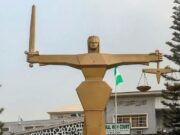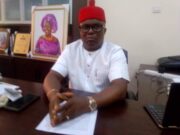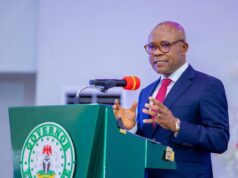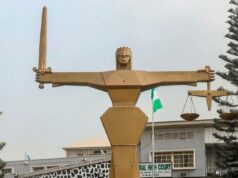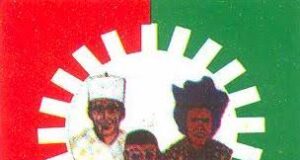Following his expulsion from the Peoples Democratic party, PDP, over anti-party activities, the former Enugu Governor, Chimaroke Nnamani went to court to challenge the decision of the party saying he was not given fair hearing in accordance with the PDP’s constitution.
An Abuja Federal High Court headed by Justice James Omotosho on Monday, nullified the expulsion of Senator Nnamani from the PDP.
Justice Omotosho said that going by the Article 57 of the Constitution of the PDP, it was only the National Executive Council (NEC) that can convene a disciplinary committee as against the National Working Committee (NWC), which took the decision.

The judge said that the constitution of the party stipulated that it was the NEC that was vested with the power to take disciplinary action against any erring member who is a governor, deputy governor and a serving member of the National Assembly.
The News Agency of Nigeria (NAN) reports that Nnamani, who represented Enugu East Senatorial District in the 9th Senate, lost his re-election bid to a Labour Party candidate, Kelvin Chukwu, in the Feb. 25 poll.
The PDP NWC, at its 566th meeting, had expelled the former senator on Feb. 10 for allegations bordering on anti-party activities.
He was initially suspended on Jan. 20 before he was subsequently expelled.
Nnamani was alleged to have campaigned for the presidential candidate of the All Progressives Congress (APC), Sen. Bola Tinubu, against the PDP presidential candidate, Alhaji Atiku Abubakar.
NAN reports that Tinubu was declared the winner of the Feb. 25 presidential election by the Independent National Electoral Commission (INEC) after polling the highest votes and was sworn in as Nigeria’s president on May 29.

But Nnamani, in a suit marked: FHC/ABJ/CS/163/23 filed on Feb. 6, had sued the INEC, PDP national chairman and the NWC as 1st to 3rd respondents over alleged breach of his fundamental rights to fair hearing.
In the originating summons, the plaintiff asked the court to determine whether he could be suspended without giving him the constitutional right to fair hearing.
He wanted the court to determine having regard to the provisions of Article 57 of the party, the decision of the NWC suspending him on Jan. 20 was not null and void.
He, therefore, prayed the court to declare that by virtue of the party’s constitution, the respondents did not validly conduct a disciplinary measure against him before his suspension.
Nnamani argued that besides being a serving senator, he was a two term governor of Enugu State.

He said that he was neither notified of any complaint against him nor afforded opportunity to fair hearing.
But the respondents, in a counter affidavit and a preliminary objection, sought an order dismissing the suit.
They argued that Nnamani campaigned for another political party while being a member of the PDP.
They said contrary to his argument, the party had the power to suspend him having being found to engage in anti-party activities.
They further argued that the issues bordered on the internal affairs of the party which the court lacked the jurisdiction to determine.
Justice Omotosho said that though the Supreme Court held that the issue of party membership, etc, was within the party’s jurisdiction and a no-go area to the courts, he said Section 46(2) of the 1999 Constitution vested the power on the court to hear alleged breach of person’s rights
He cited previous cases to back his decision.
“This court will not dabble into the internal affairs of party but will restrict itself to whether the fundamental right of the plaintiff has been breached,” he said.
He said though these rights are not absolute, they are entrenched in Chapter 4 of the 1999 Constitution of Nigeria, and that the African Charter on Peoples Rights also makes provisions for fundamental rights.
The judge agreed that a member of a political party must abide by its rules and regulation, having freely submitted himself to its rules, he however said that the court would only interfer where the party had violated its own rules and regulation.
He observed that Articles 4 and 5 of the PDP gave provisions for fair hearing to erring members.
According to him, fair hearing is giving equal opportunity to parties and where fair hearing has been done, a party cannot complain.
“But the complaint of the plaintiff is that he was not giving fair hearing,” he said, in accordance with Article 57 of the party’s constitution.

“The law is clear that specific provisions override general provisions,” he said.
He said the available fact before the court was that the NWC, at its 566th meeting, considered all the allegations against Nnamani and approved his suspension for one month.
Besides, the judge also observed that it was the NWC that expelled him on Feb. 10 in a press release.
Omotosho, who said that this was a gross violation of the party’s constitution, held that this had rendered all the actions null and avoid.
He said the court was convinced that the plaintiff had been able to establish his case against the respondents.
Justice Omotosho consequently gave an order nullifying the decision of the PDP NWC that was taken on Feb. 10, expelling the ex-lawmaker.




